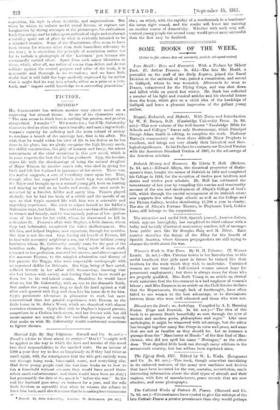FICTION.
Me. Gatswoneuv has written another very clever novel on a depressing but eternal theme. As one of his characters says: The man seems to think love is nothing but passion, and passion always fatal. I wonder ! " We wonder too ; but if Mr. Clalsworthy chooses to deal so often with man's brutality and man's ingratitude, woman's capacity for suffering and the stern refusal of society to condone a breach of the marriage law, that is his affair. Wo %midis that he would widen his view of life in his fiction as he has done in his plays, but wo gladly recognize the high literary merit, the skilful construction, tho play of humour and fancy, the adroit management of the chief situations in this now novel. which is in acne respects tho best that he has produced. Gyp, tho heroine, *darts life with the disadvantage of being the natural daughter of Major Winton by another man's wife, who dial in giving her birth and left her husband in ignorance of her secret. There was, the author suggests, a sort of hereditary curse upon her. Thug, though after her supposed father's death Gyp was adopted by tin Major and brought up as a normal young girl, keen on hunting noel dancing as well as on books mitt music, slso must needs be attracted by a &vodkas fiddler and .umarry hint Pierson played divinely, but he had the brain of a rabbit and the morals of an ape, so that Gyp's married life with him was a nsiserable and degrading experience. She tried to adjust herself to the fiddler's Bohemian ways, but failed. She could not cure him of his addiction to women and brandy, and he was insanely jealous of her—jealous even of her love for her child, whom he threatened to kill in a drunken fit. Ifforseas affair with Daphne, a little dancer, whom Gyp had befriended, completal tine wife's disillusionment. She left him, and helped Daphne, now ropoulant, through her troubles. But that is not the end. Gyp, having rid herself or Eamon, fell in love with a country neighbour's son, ono of those brilliant young barristers whom Mr. Galswerthy usually casts for the pert of the heartless male. Daphne the clamor, being made of stern stuff, returned to her profession, renewed her success, and also mannered the amorous Fiorsen, to the mingled admiration and dismay of her parents time Wagg,s, who were respectable tradespeople with an ingrained dislike for Bohemia. But Gyp, being of finer metal, eaffered bitterly in her affair with Sununerhay, knowing that sine had broken with society and fearing that her lover would go from her to his red-haired cousin. Doubtless he would have done se, but Mr. Calswortly, with an eye to the dramatic finish, first makes tine young man long to dash his head against a wall after each quarrel with Gyp and then lets his horse do it for him. Gyp's passionate adventure is pleasanter to read, but more conventional than her painful experiences with Monsen in the little house in St. John's Wood, which are described witls almost excursive clearness. Gyp's first visit to Daphne's injured parents, somewhere in a Chelsea back-street, and hoe lessons with her old music-master are among the few excellent passages of comedy that make us wish Mr. Galaworthy would condescend sometimes
to lighter themes. •


























 Previous page
Previous page